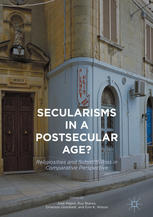

Most ebook files are in PDF format, so you can easily read them using various software such as Foxit Reader or directly on the Google Chrome browser.
Some ebook files are released by publishers in other formats such as .awz, .mobi, .epub, .fb2, etc. You may need to install specific software to read these formats on mobile/PC, such as Calibre.
Please read the tutorial at this link: https://ebookbell.com/faq
We offer FREE conversion to the popular formats you request; however, this may take some time. Therefore, right after payment, please email us, and we will try to provide the service as quickly as possible.
For some exceptional file formats or broken links (if any), please refrain from opening any disputes. Instead, email us first, and we will try to assist within a maximum of 6 hours.
EbookBell Team

4.1
90 reviewsThis volume ethnographically explores the relation between secularities and religious subjectivities.As a consequence of the demise of secularization theory, we live in an interesting intellectual moment where the so-called ‘post-secular’ coexists with the secular, which in turn has become pluralized and historicized. This cohabitation of the secular and post-secular is revealed mainly through political dialectical processes that overshadow the subjective and inter-subjective dimensions of secularity, making it difficult to pinpoint concrete sites, agents, and objects of expression.
Drawing on cases from South America, Africa, and Europe, contributors apply key insights from religious studies debates on the genealogies and formations of both religion and secularism. They explore the spaces, persons, and places in which these categories emerge and mutually constitute one another.